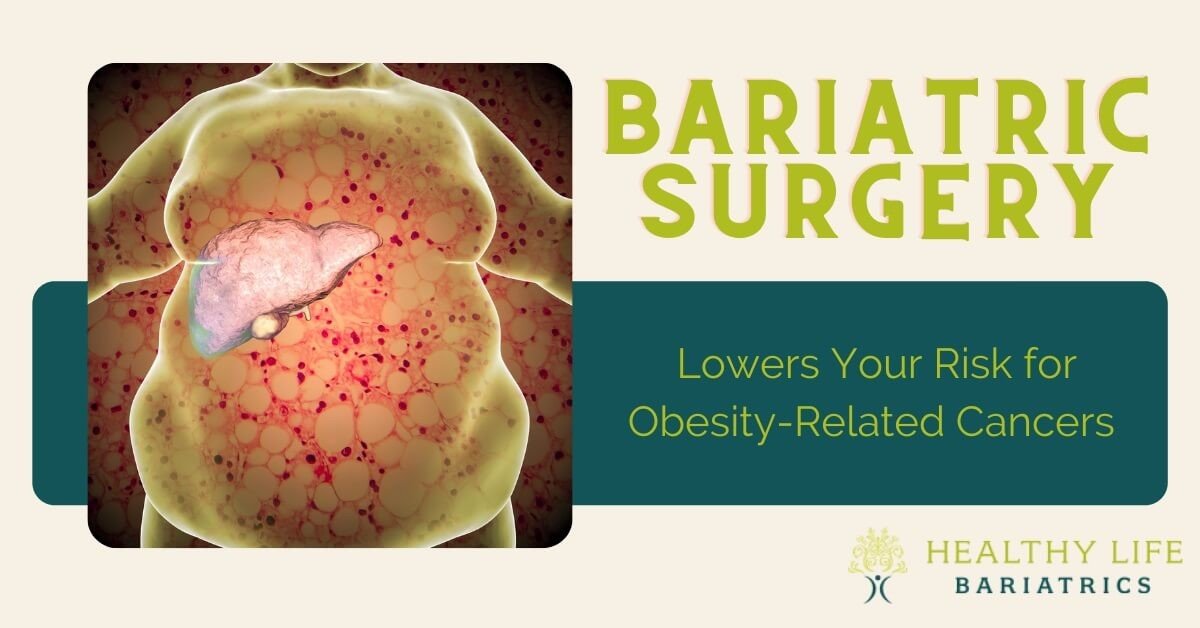
Chances of cancers are reduced using bariatric surgery, as obese people have higher risks of it.
We are all familiar with cancer and how fatal the disease can be. Did you know that obesity is second only to cigarette smoking as the most preventable cancer in the U.S.? It’s true.
Obesity may not be a choice, but it can be treated using bariatric surgery. Doing so can keep you from suffering from up to thirteen separate cancers, according to the American Society for Metabolic and Bariatric Surgery (ASMBS).
The cancers associated with obesity include the breast, colon, rectum, gallbladder, kidney, thyroid, pancreas, and uterine lining (endometrium). These cancers are also known as obesity-related or OACs, and sufferers seem to be getting younger yearly.
Yet, hope is on the horizon. Studies show that bariatric surgery can lower your risk of developing obesity-related cancers. This is good news for obese people who want a better quality of life and a longer life.
The link between obesity and cancer is not well known. However, doctors and scientists do believe they have some idea as to why the link exists.
Fat cells produce hormones such as insulin and estrogen. These hormones stimulate cell growth and promote the development of tumors. Fatty tissue can also have a detrimental effect on the body’s immune response. The combination of these factors can lead to the development of several cancers. One study showed that obesity leads to the development of 40% of all cancers diagnosed nationwide.

The studies show a positive correlation between bariatric procedures and lowered cancer risk. These studies focus on the morbidly obese. These individuals have a body mass index (BMI) of 40 or above. Patients with a BMI of 35 are also included when co-morbidities are present, such as type 2 diabetes mellitus (otherwise referred to as adult-onset diabetes), high blood pressure, sleep apnea, and arthritis of the joints and knees.
Amazingly, the ASMBS states that the chances of developing cancer after bariatrics are cut in half as long as the patient loses at least 20% of their excess weight.
Considering that most patients lose up to 60% or more of their excess weight after surgeries like gastric sleeve and gastric bypass, this is good news for anyone considering meeting with a bariatric surgeon.
As far as specific cancers are concerned, numerous studies showed equally positive results. Let’s look at those now.
A 20-year analysis of weight loss surgery patients showed that gastric sleeve and bypass procedures significantly lowered the risk of pancreatic cancer after bariatric surgery. This is an important study since pancreatic cancer has a low survivability rate. Only 3% of patients survive longer than five years.
The study followed over a million patients with obesity. Many also had diabetes. Of these patients, 10,000 underwent bariatric surgery (73% were women). The results showed that patients who had surgery were less likely to develop pancreatic cancer than those who didn’t undergo surgery.

According to French researchers, people who are obese have a 34% higher risk of developing colon cancer. This risk is highest among those aged 50 to 75. Undergoing weight loss surgery has been shown to bring that risk back down to normal.
However, the researchers state that there is a caveat. The study by researchers at the Centre Hospitalier Universitaire de Nice showed that there is merely an association of lowered risk. The study does not prove that the lowered risk is conclusive.
Studies from the University of Utah School of Medicine and Gothenburg University in Sweden showed that women who underwent bariatric surgery had a 40% reduction in cancer death from female cancers like cervical cancer, ovarian cancer, vaginal/vulvar cancer, and endometrial or uterine cancer. The women also showed a 60% reduction in death overall.
A study published in the Annals of Surgery by researchers at the University of Cincinnati (UC) College of Medicine showed that bariatric surgery lowered the risk of several cancers, including postmenopausal breast, colon, pancreatic, and endometrial. Cancer-free survival rates were 98.45%, 97.2%, and 94.11% at the three, five, and ten-year marks, respectively.
A Swedish study showed that bariatric patients had a 57% lower risk of developing melanoma and a 41% lower risk of developing squamous cell carcinoma. The bariatric patient studies were compared to obese individuals who received conventional treatments only.
Experts believe the lowered risk of skin cancer is due to the alterations in metabolic and endocrine function. These altercations happen after bariatric surgery.
Not only does bariatric surgery lower the risk of heart disease and type 2 diabetes, among other weight-related ailments, but losing weight with surgery can also lower the chances of a cancer diagnosis. While we need more research to determine the long-term viability of these studies, researchers believe they are on the right track. For obese individuals, these studies should give hope that obesity treatment can help in more ways than one, especially when living an extended and healthy life.
Learn more about bariatric procedures like gastric sleeve and gastric bypass by contacting Healthy Life Bariatrics in Los Angeles, California. You would be a good candidate for these surgeries if you have tried to lose weight through conventional means but to no avail. Dr. Babak Moeinolmolki has an excellent track record of helping patients like you defeat obesity quickly and healthily.
Please schedule a consultation with Dr. Moeinolmolki by calling our office today. Don’t forget to ask about our fast-track program. With this program, you can go from consultation to surgery in a few weeks. You can reach us at (310)807-1735.